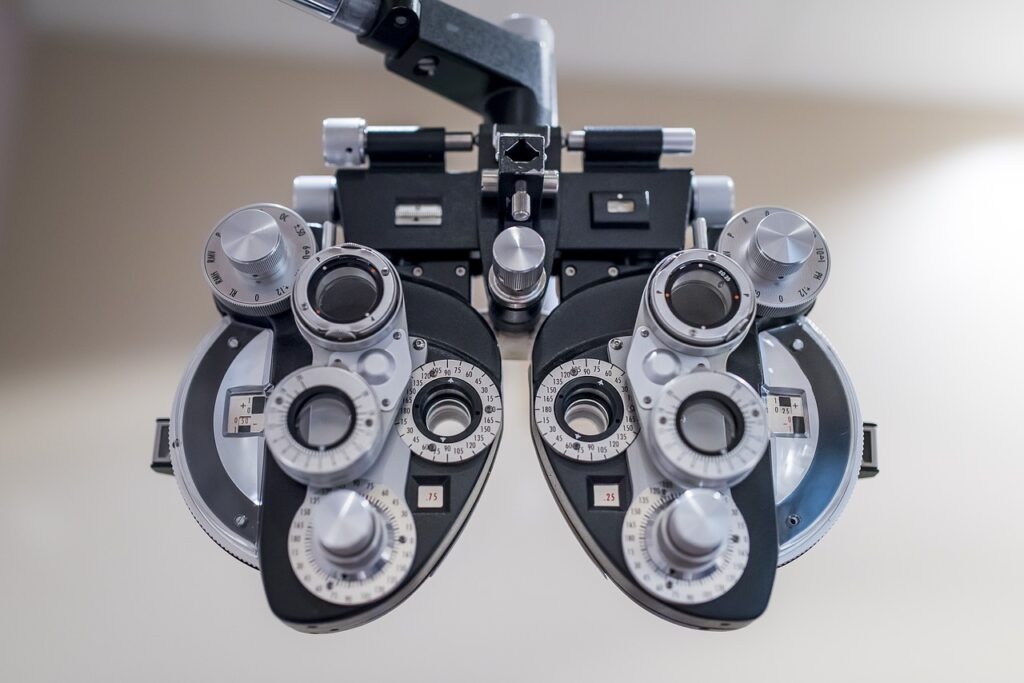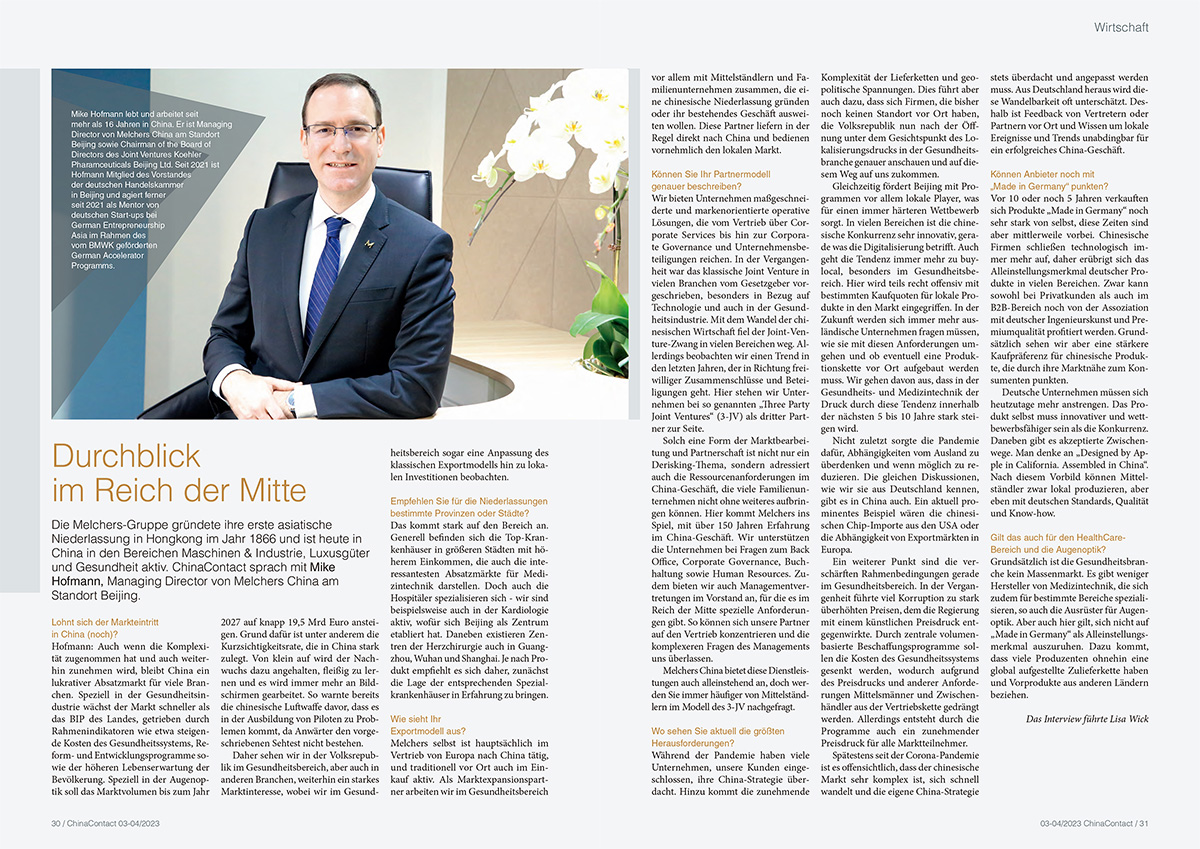Interview with “ChinaContact” about Market Entry for Ophthalmic Optics and Healthcare Companies into the Chinese Market

The Melchers Group founded its first Asian branch in Hong Kong in 1866 and is now active in China in the areas of machinery and industrial products, luxury goods, and healthcare. ChinaContact spoke to Mike Hofmann, Managing Director of Melchers China in Beijing.

Mike Hofmann has lived and worked in China for close to 17 years. He is the Managing Director of Melchers China in Beijing and Chairman of the Board of Directors of the joint venture Koehler Pharmaceuticals Beijing Ltd. Since 2021, Hofmann has been a member of the board of the German Chamber of Commerce in North China and has also been mentoring German start-ups at German Entrepreneurship Asia, part of the BMWK-funded German Accelerator Program.
Is market entry in China (still) worthwhile?
Hofmann: Even though the complexity has increased and will continue to increase, China remains a lucrative sales market for many industries. In the healthcare industry, in particular, the market is growing faster than the country’s GDP, driven by general indicators such as rising healthcare system costs, reform and development programs, and the population’s longer life expectancy. Especially in ophthalmic optics, the market volume is expected to boost to almost 19.5 billion euros by 2027. One reason is the short-sightedness rate, which is rising sharply in China. Young people are encouraged to study hard from an early age, and more and more work is done on screens. The Chinese Air Force has already warned that problems arise in pilot training because candidates cannot pass the mandatory eye test.
Therefore, we are seeing strong market interest in the healthcare sector in China and other sectors, whereby we are even observing an adjustment of the traditional export model towards local investments.
Do you recommend specific provinces or cities for establishing branches?
That depends very much on the sector and products. In general, the top hospitals are located in larger cities with higher incomes, representing the most interesting sales markets for medical technology. However, hospitals are also specializing – we are also active in cardiology, for example, for which Beijing has established itself as a center. There are also cardiac surgery centers in Guangzhou, Wuhan and Shanghai. Depending on the product, it is therefore advisable to first identify the location of the relevant specialist hospitals.
What does your export model look like?
Melchers is mainly active in sales from Europe to China and has traditionally also been active in sourcing in China. As a market expansion partner, we work in the healthcare sector primarily with medium-sized companies and family businesses that want to set up a Chinese subsidiary or expand their existing business. These partners generally deliver directly to China and primarily serve the local market.
Can you describe your partner model in more detail?
We offer companies tailor-made and brand-oriented operational solutions ranging from sales and corporate services to corporate governance and shareholdings. In the past, the classic joint venture was required by law in many sectors, particularly concerning technology and also in the healthcare industry. With the transformation of the Chinese economy, the joint venture obligation has been removed in many areas. However, we have observed a trend in recent years toward voluntary mergers and participation. Here, we support companies as a third partner in a so-called “three-party joint venture.”
Such a form of market development and partnership is not only a derisking issue but also addresses the resource requirements of doing business in China, which many family businesses cannot easily afford. This is where Melchers comes in, with over 150 years of experience in doing business in China. We support companies with back office, corporate governance, accounting, and human resources issues. We also offer management representation on the board of directors, for which there are special requirements in China. This allows our partners to concentrate on sales and leave the more complex management issues to us.
Melchers China also offers these services on a stand-alone basis; however, they are increasingly in demand from medium-sized companies in the 3-JV model.
Where do you see the biggest challenges currently?
Many companies, including our customers, have rethought their China strategy during the pandemic. Apart from this is the increasing complexity of supply chains and geopolitical tensions. However, this also means that companies that have not yet had a local presence are now taking a closer look at China after the opening regarding localization pressure in the healthcare industry and are approaching us in this way.
At the same time, Beijing is using programs to promote local players in particular, which leads to increasingly fierce competition. Chinese competitors are very innovative in many areas, especially when it comes to digitalization. There is also an increasing trend towards buy-local, particularly in the healthcare sector. In some cases, there is quite aggressive intervention in the market with certain purchase quotas for local products. In the future, more and more foreign companies will have to ask themselves how they will deal with these requirements and whether a local production chain may need to be established. Due to this trend, we assume that the pressure in the healthcare and MedTech sectors will increase significantly over the next five to ten years.
Last, the pandemic has made many companies and countries rethink their dependencies on foreign countries and reduce them where possible. The same discussions we are familiar with from Germany also occur in China. A prominent example is Chinese chip imports from the USA or China’s dependence on European export markets.
Another point is the tougher framework conditions in China, especially in the healthcare sector. In the past, corruption led to highly inflated prices, which the government countered with artificial price pressure. Central volume-based procurement programs are intended to reduce the costs of the healthcare system, forcing middlemen out of the distribution chain due to price pressure and other requirements. However, the programs also create increasing price pressure for all market participants.
Since the coronavirus pandemic at the latest, it has become clear that the Chinese market is very complex and changing rapidly and that a company’s own China strategy must be constantly reconsidered and adapted. This changeability is often underestimated in Germany. That is why feedback from local representatives or partners and knowledge of local events and trends is essential for successful business in China.
Can providers still score points with “Made in Germany”?
Ten or even five years ago, products “Made in Germany” sold themselves very well, but those days are now over. Chinese companies are catching up more and more technologically, so the unique selling point of German products is no longer necessary in many areas. Although in both B2C and B2B areas, products can still benefit from the association with German engineering and premium quality, however, in general, we see a stronger buying preference for Chinese products, which score points thanks to their proximity to the consumer.
German companies have to work harder these days. The product itself must be more innovative and competitive than the competition. There are also accepted intermediate paths. Just think of “Designed by Apple in California. Assembled in China”. Following this model, SMEs can produce locally but with German standards, quality, and expertise.
Does this also apply to the healthcare sector and ophthalmic optics?
In principle, the healthcare sector is not a mass market. Fewer medical technology manufacturers also specialize in certain areas, such as suppliers of ophthalmic optics. However, here, too, it is important not to rest on “Made in Germany” as a USP. In addition, many manufacturers already have a global supply chain and source preliminary products from other countries.
This interview was conducted by Lisa Wick and published in German in the business magazine “ChinaContact” 07-2023 under the original title “Durchblick im Reich der Mitte.” This is a translated reprint.

How Melchers supports you in China
With 155 years of business experience in various sectors in China, we know that every company needs its unique approach to the Chinese market. China’s business world is continually changing and varies significantly from region to region in terms of prosperity, regulation, openness to business, and other factors influencing the business environment. Due to its size and diversity, China can hardly be compared to any other country in the world. This is also true for the health care sector. Our longstanding experience and knowledge along the value chain of the Chinese healthcare industry through sales, management, and compliance activities, as well as corporate services, enables us to offer tailored and brand-oriented market approaches for all our partners. We help our selected brand partner to understand the Chinese healthcare market, quantify the scale and the competitor landscape, and identify short, mid, and long-term opportunities for market growth.
We take equity shares in our partners’ China operation with a focus on long-term partnerships, if desired.
Contact Melchers today via [email protected] about establishing a presence or doing business in China or go to Healthcare • Melchers China (melchers-china.com) for more information.


